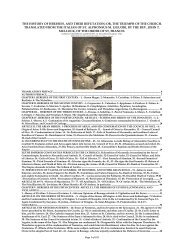The Writings of St. Francis of Assisi - + Saints' Works
The Writings of St. Francis of Assisi - + Saints' Works
The Writings of St. Francis of Assisi - + Saints' Works
Create successful ePaper yourself
Turn your PDF publications into a flip-book with our unique Google optimized e-Paper software.
THE WRITINGS OF ST. FRANCIS OF ASSISI<br />
Christ, · who said: "If you want to be perfect, go" and "sell" all (cf. Lk 18:22) "that you have, and<br />
give it to the poor and you shall have treasure in Heaven; and come, follow Me" (Mt 19:21). ·<br />
And "If anyone wants to come after Me, let him deny his very self and take up his cross and<br />
follow Me" (Mt 16,24). · Likewise: "If anyone wants to come to Me and does not hate father and<br />
mother and wife and sons and daughters, and moreover even his own life, he cannot be My<br />
disciple" (Lk 14:26) · And: All, who forsake father and mother, brothers and sisters, wife or sons,<br />
homes or fields for My sake, shall accept a hundredfold and shall posses eternal life (cf. Mt<br />
19:29; Mk 10:29; Lk 18:29)<br />
Chapter II<br />
On the reception and clothing <strong>of</strong> the friars<br />
If anyone, wanting to adopt 353 this life by divine inspiration, has come to our friars, let<br />
him be received kindly by them. · And if he has been firm (in his resolution) to adopt our life, let<br />
the friars beware much <strong>of</strong> themselves, lest they allow themselves to enter into his temporal<br />
affairs, but let them present him before their Minister (provincial), as soon as they are able. · Let<br />
the minister indeed receive him kindly and encourage him and explain to him diligently the<br />
tenor 354 <strong>of</strong> our life. · Which when done, let the aforesaid, if he wants and can spiritually 355 (do so)<br />
without impediment, sell all his (possessions) and strive to pay 356 them all out to the poor. · Let<br />
the friars and the minister <strong>of</strong> the friars beware <strong>of</strong> themselves, that they in no manner allow<br />
themselves to enter into his affairs · nor receive any money, neither through themselves nor<br />
through an interposed person. 357 · If however they are in need, the friars can receive other<br />
necessities for the body, except money, for the sake <strong>of</strong> necessity as other poor (can). · And when<br />
he has come back, let the minister grant him the clothes <strong>of</strong> probation for one year, namely two<br />
tunics without a capuche and a cord and breeches and a caperone (which hangs) down to the<br />
cord. 358 · With the year and end <strong>of</strong> probation indeed finished, let him be received to obedience. 359<br />
· Afterwards it shall not be licit for him to enter another religion 360 nor 'wander outside <strong>of</strong><br />
obedience' by the mandate 361 <strong>of</strong> the lord Pope and according to the Gospel; because "no one<br />
256-258.<br />
353 see fn. 260.<br />
354 i.e. its austerity and demands.<br />
355 i.e. moved by divine grace, and not self-coerced in order to please men.<br />
356 see fn. 264.<br />
357 <strong>The</strong> precept about money refers to Chapter VIII <strong>of</strong> this rule; the strictures regarding the<br />
reception <strong>of</strong> the new member are intended to both discourage unworthy candidates from joining<br />
and the ministers from accepting them.<br />
358 For an explanation <strong>of</strong> these vestments see fns. 266-270.<br />
359 i.e. to the pr<strong>of</strong>ession <strong>of</strong> the vows <strong>of</strong> obedience, poverty and chastity; cf. fn. 271.<br />
360 cf. fn. 156. Since religious life is a pursuit <strong>of</strong> perfection, the Church rarely permitted religious<br />
to change from stricter orders to lest strict ones. <strong>St</strong>. <strong>Francis</strong> includes this regulation because the<br />
observance <strong>of</strong> the religious life taught by Our Lord cannot possibly, in itself, be less perfect than<br />
any other form. For a fuller treatment <strong>of</strong> this see <strong>St</strong>. Bonaventure's Apologia Pauperum.<br />
361 This is a reference to Pope Honorius III's Cum secundum consilium (Sept. 20, 1220 A.D.),<br />
which prescribed a one year probation prior to admission to vows, and a subsequent stability in<br />
the Order; it thus serves to date this Rule's final composition after this date; cf. K. Esser, p. 531.<br />
Page - 84













